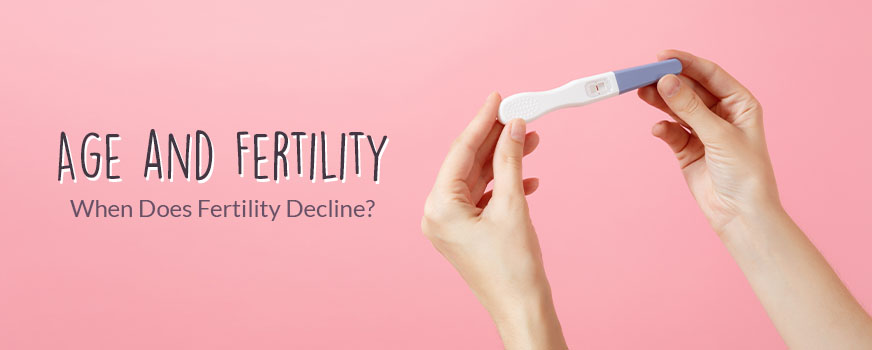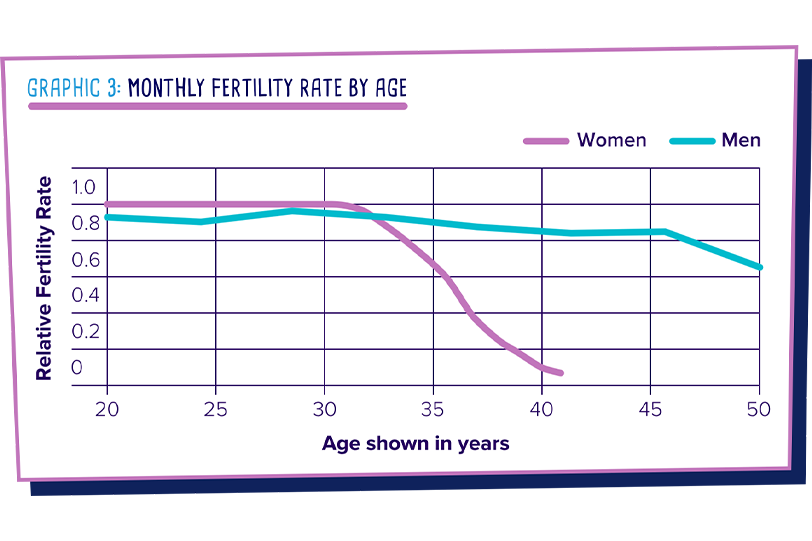
You have probably heard that your age impacts your fertility and the chances of having a successful pregnancy. While age and fertility certainly go hand-in-hand, the effect of age may not be as dramatic as some make it seem. Learn more about the connection between age and if or when fertility begins to decline for both men and women.
Age and Fertility for Men
When does Fertility Decline for Men?
Much of the talk around age and fertility revolves around women, men can also be affected by age when it comes to fertility. The impact of older age on men’s fertility is lower than it is for women, as many men remain fertile until their 60s, but recent studies have found evidence of fertility diminishing as a man gets older.
Conceiving becomes more difficult as men age, and potential effects of age include:
- Conception taking 5 times longer to achieve once a man is over 45 years old
- Twice increased risk of miscarriage after a man is over 45
- Decreased amount in semen starting at age 20 and lowered ability for sperm to perform well
- In vitro fertilization (IVF) having 5 times increased failure rate after the age of 41 for men
- Heightened chance of autism in children from fathers over the age of 30
How to Boost Male Fertility
While there is no way to turn back the clock on age, there are a few ways for men to improve their fertility and chances of conceiving as they get older. The main key for men’s fertility is to live a healthy lifestyle with a balanced diet, regular exercise, and routine appointments with health care professionals to ensure everything is on the right track. Additionally, cut down on harmful lifestyle choices such as smoking and excessive drinking that reduce sperm count.

Source: British Fertility Society
Age and Fertility for Women
When does Fertility Decline for Women?
Unfortunately, women have more of a restricted timeline when it comes to age and fertility. As women age, eggs age too, leading to complications in pregnancies later in life. Once women hit their late-30’s, they have approximately 2.5% of their eggs remaining, some containing defects that developed with age. Between the ages of 30 and 35, women’s fertility begins to steadily decline until menopause with chances of conception lowering more every year after the mid-30s.
This is where the common misconception comes in about women being unable to conceive after 35 – while fertility is in a steady decline, there is still a chance for a successful and healthy pregnancy until menopause. However, time to conceive increases and the chances of a successful pregnancy decrease. Once a woman is 45, the American College of Obstetricians and Gynecologists indicates a natural pregnancy is “unlikely for most women.”
Potential effects of age on fertility for women include:
- Chances of a woman’s monthly conception drops from 25-30% in their 20s to 5% in their 40s
- Increased chance of miscarriage
- Higher risk of chromosomal abnormalities in older eggs
- Heightened chance of mother developing diabetes and high blood pressure
- Lower chance of IVF successfully taking after a woman is over the age of 40
How to Boost Female Fertility
Similarly to men, the only real way to boost female fertility is by living a healthy lifestyle. Eating a healthy diet filled with important nutrients, exercising regularly, cutting out bad habits such as smoking and alcohol use, and speaking with your doctor during regular checkups to stay up-to-date are the three key components to naturally increasing fertility for women. Additionally, tracking your fertility can be a wonderful tool for being in-tune with your body and discovering if any further action needs to be taken.
Age can be an intimidating topic if you are trying to conceive. Know that older age doesn’t necessarily mean you cannot conceive and that there are options available if you are considering growing your family later in life. If you have difficulty conceiving regardless of your age or sex, make an appointment with a fertilization specialist to run through tests and discuss potential solutions.



